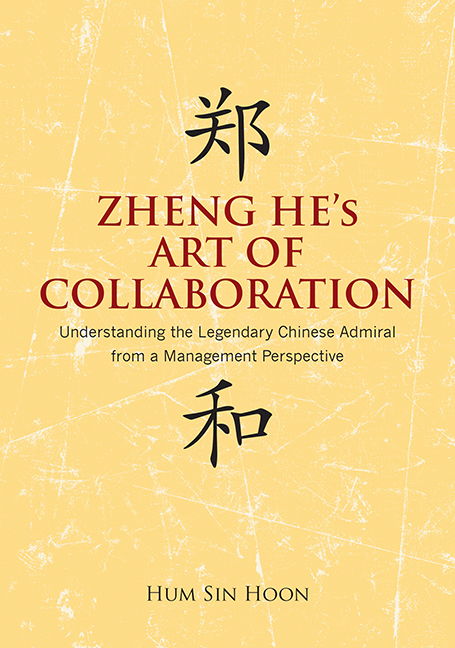 Zheng He's Art of Collaboration
Zheng He's Art of Collaboration Published online by Cambridge University Press: 21 October 2015
The last decade of the twentieth century and the first decade of the twenty-first century have enjoyed peace and yet the world has been full of the smoke of gunpowder, conflicts and endless suicidal bomb explosions. One wonders what has gone wrong with our civilization that leads to the world becoming so chaotic, with countless ordinary people being destitute and dying.
Of course, one of the reasons is the ideological differences that lead to the struggle and clash of interests among the major powers. Former President of the United States, George W. Bush, maintained the policy of U.S. domination, unilateralism and forestalling of others who do not identify with the American position. Such behaviour has drawn the United States into deep trouble ever since.
Three years ago, President Barack Obama was well aware that George W. Bush's policy would drag the U.S. into an abyss. So he rode on the electoral slogans of “Change” and “Anti-war” and ascended to the U.S. Presidency, for which he was awarded the Nobel Peace Prize. Unfortunately, under the pressure of the hawkish faction, he promptly dispatched thirty thousand soldiers to Afghanistan. The recent surge of the “Arab Spring” and “Occupy Wall Street” movements highlight the discontent against the current political system. Does this mean that there is no other substitute system in mankind's 5,000 years of civilization?
In 1988, seventy-five Nobel Laureates assembled in Paris and issued a joint declaration: “Mankind in the 21st century requires learning from Confucian Wisdom prevailing 2,500 years ago in order to survive.”
What is Confucian Wisdom? Generally speaking, it means Confucian thought. Confucian orthodoxy is the way “to ordain conscience for Heaven and Earth, to strive for people's life, to follow the Sage and spread his teachings, to create eternal peace for future generations”; “to care for the common people and to assume responsibility to serve the world”. This orthodoxy seeks to secure good life and fortune for the people, dedicate oneself to the people and be patriotic. Guided by the principle of people first, society second and monarch less important, Confucian mandarins implemented governance of benevolence, humanity and virtue to realize an ideal and perfect society. This ideology that emphasizes the importance of the collective group, society and state is very different from the western ideology that places emphasis on individual freedom and democracy.
To save this book to your Kindle, first ensure [email protected] is added to your Approved Personal Document E-mail List under your Personal Document Settings on the Manage Your Content and Devices page of your Amazon account. Then enter the ‘name’ part of your Kindle email address below. Find out more about saving to your Kindle.
Note you can select to save to either the @free.kindle.com or @kindle.com variations. ‘@free.kindle.com’ emails are free but can only be saved to your device when it is connected to wi-fi. ‘@kindle.com’ emails can be delivered even when you are not connected to wi-fi, but note that service fees apply.
Find out more about the Kindle Personal Document Service.
To save content items to your account, please confirm that you agree to abide by our usage policies. If this is the first time you use this feature, you will be asked to authorise Cambridge Core to connect with your account. Find out more about saving content to Dropbox.
To save content items to your account, please confirm that you agree to abide by our usage policies. If this is the first time you use this feature, you will be asked to authorise Cambridge Core to connect with your account. Find out more about saving content to Google Drive.